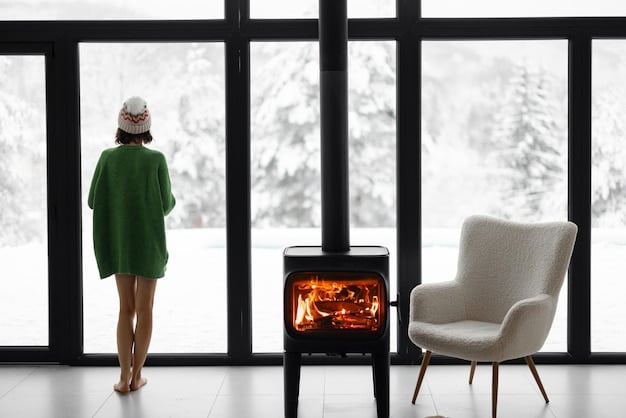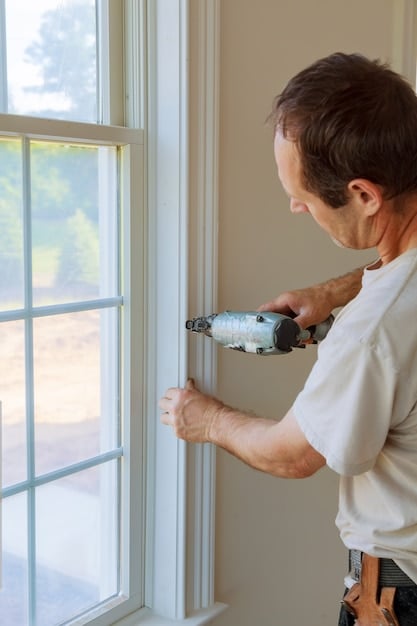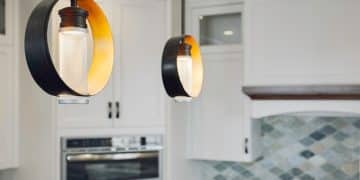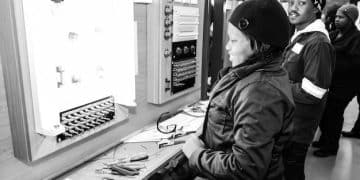Upgrade Your Windows: Save 25% on Heating Bills

Anúncios
Upgrading your windows can lead to significant savings on heating bills, potentially reducing costs by up to 25% during the winter months through improved insulation and energy efficiency.
Are you dreading the arrival of winter due to the high heating bills? Upgrading your windows could be the solution you need. A simple yet effective upgrade can lead to substantial savings. Let’s explore how you can upgrade your windows: save 25% on heating bills this winter.
Anúncios
Understanding the Energy Efficiency of Your Current Windows
Before diving into window upgrades, it’s essential to understand how energy-efficient your current windows are. This assessment will help you determine the best course of action and the potential savings you can achieve.
Assessing Your Windows’ U-Value
The U-value measures how well a window insulates. A lower U-value indicates better insulation, meaning less heat escapes during the winter and less heat enters during the summer.
Anúncios
Checking for Air Leaks and Drafts
Air leaks around your windows can significantly reduce their energy efficiency. Simple tests can help you identify these leaks and determine the extent of the problem.
- Use a lit candle or incense stick near the window frame to detect drafts. If the flame flickers, there’s likely an air leak.
- Feel around the window frame for cold air. Pay special attention to the corners and edges.
- Inspect the caulk and weather stripping for cracks or damage.

By assessing both the U-value and the presence of air leaks, you can get a clear picture of your windows’ energy performance and identify areas for improvement.
Types of Energy-Efficient Window Upgrades
When it comes to upgrading your windows for energy efficiency, you have several options. Each type offers varying levels of insulation and cost-effectiveness, so it’s important to choose the one that best fits your needs and budget.
Double-Pane Windows
Double-pane windows consist of two glass panes with a layer of gas, such as argon or krypton, in between. This gas-filled space provides better insulation than single-pane windows.
Low-E Coating Windows
Low-E (low-emissivity) coatings are thin, transparent coatings applied to the glass surface. These coatings reduce the amount of heat that passes through the window, keeping your home warmer in the winter and cooler in the summer.
Triple-Pane Windows
Triple-pane windows have three panes of glass with two layers of gas in between. This design offers the highest level of insulation, making them ideal for colder climates.
Selecting the right type of window upgrade can significantly improve your home’s energy efficiency and reduce your heating bills. Consider your climate, budget, and energy-saving goals when making your decision.
DIY Window Insulation Techniques
If a full window replacement isn’t feasible right now, there are several do-it-yourself techniques you can use to improve your windows’ insulation. These methods are cost-effective and can provide immediate relief from drafts and high energy bills.
Applying Weather Stripping
Weather stripping is a simple and inexpensive way to seal gaps around your window frames. It comes in various materials, such as foam, felt, and rubber.
Using Caulk to Seal Gaps
Caulk is another effective way to seal gaps and cracks around your windows. It provides a more permanent solution than weather stripping and can be used on both interior and exterior surfaces.

Installing Window Film
Window film is a thin, transparent sheet that you apply to the glass surface. It can help reduce heat transfer and block harmful UV rays.
- Clean the window thoroughly before applying the film.
- Use a spray bottle to apply a thin layer of water to the glass.
- Smooth out any air bubbles with a squeegee.
These DIY insulation techniques can provide a noticeable improvement in your home’s energy efficiency, helping you save money on heating bills without the expense of a full window replacement.
Professional Window Installation vs. DIY
Deciding between professional window installation and DIY can be challenging. Both options have their pros and cons, and the best choice depends on your skill level, budget, and the complexity of the project.
Benefits of Professional Installation
Professional window installers have the experience and expertise needed to ensure a proper fit and seal. They can also handle any unexpected issues that may arise during the installation process.
Considerations for DIY Installation
DIY window installation can save you money on labour costs, but it requires a certain level of skill and attention to detail. It’s important to accurately measure the window opening and follow the manufacturer’s instructions carefully.
Cost Comparison and Potential Savings
While DIY installation can be cheaper upfront, it’s important to consider the potential costs of mistakes. Improperly installed windows can lead to air leaks, water damage, and reduced energy efficiency.
Ultimately, the decision between professional window installation and DIY depends on your personal circumstances. Weigh the pros and cons carefully to determine which option is the best fit for your needs.
Government Grants and Incentives for Energy-Efficient Upgrades in GB
In the UK (GB), the government offers various grants and incentives to encourage homeowners to make energy-efficient upgrades. These programs can help offset the cost of window replacements and other home improvements.
Overview of Available Grants
Several grants are available to help homeowners improve the energy efficiency of their homes. These grants often have specific eligibility requirements and funding limits.
How to Apply for Grants and Incentives
Applying for government grants and incentives typically involves completing an application form and providing supporting documentation, such as proof of income and energy assessments.
- Research the available grants and incentives in your area.
- Gather the necessary documentation.
- Submit your application according to the program’s requirements.
By taking advantage of these government programs, you can significantly reduce the cost of upgrading your windows and improve your home’s energy efficiency.
Maintaining Your New Energy-Efficient Windows
Once you’ve upgraded your windows, proper maintenance is essential to ensure they continue to perform optimally. Regular cleaning and inspections can help prolong their lifespan and maintain their energy efficiency.
Regular Cleaning and Inspections
Cleaning your windows regularly can help prevent dirt and grime from building up, which can reduce their transparency and energy performance.
Preventing Damage and Ensuring Longevity
Taking steps to prevent damage to your windows can help ensure they last for many years. This includes protecting them from extreme weather conditions and addressing any issues promptly.
By following these maintenance tips, you can keep your energy-efficient windows in top condition and continue to save money on heating bills for years to come.
| Key Point | Brief Description |
|---|---|
| 💰 Savings Potential | Upgrade windows to potentially save up to 25% on heating bills. |
| 🛠️ DIY vs. Professional | Consider skills, budget and project complexity for installation. |
| 🛡️ Maintenance | Regular cleaning and inspections ensure longevity and efficiency. |
| 🏢 Grants Available | Explore government grants to offset window replacement costs. |
Frequently Asked Questions
▼
Look for signs like drafts, condensation between glass panes, difficulty opening or closing, and increased energy bills despite consistent thermostat settings.
▼
Double-pane windows have two glass panes with gas in between, while triple-pane windows have three panes, offering superior insulation and energy efficiency.
▼
DIY installation is possible, but requires skill and precision. Professional installation ensures proper fit and avoids potential issues like air leaks and water damage.
▼
Yes, the UK government offers grants and incentives for energy-efficient home improvements, including window upgrades. Research available programs and eligibility requirements.
▼
Regular cleaning, inspections for drafts or damage, and prompt repairs help maintain energy efficiency and extend the lifespan of your new energy-efficient windows.
Conclusion
Upgrading your windows offers a compelling opportunity to reduce heating bills and improve your home’s energy efficiency. By understanding the benefits, exploring available options, and taking advantage of government incentives, you can make a smart investment that pays off for years to come.





